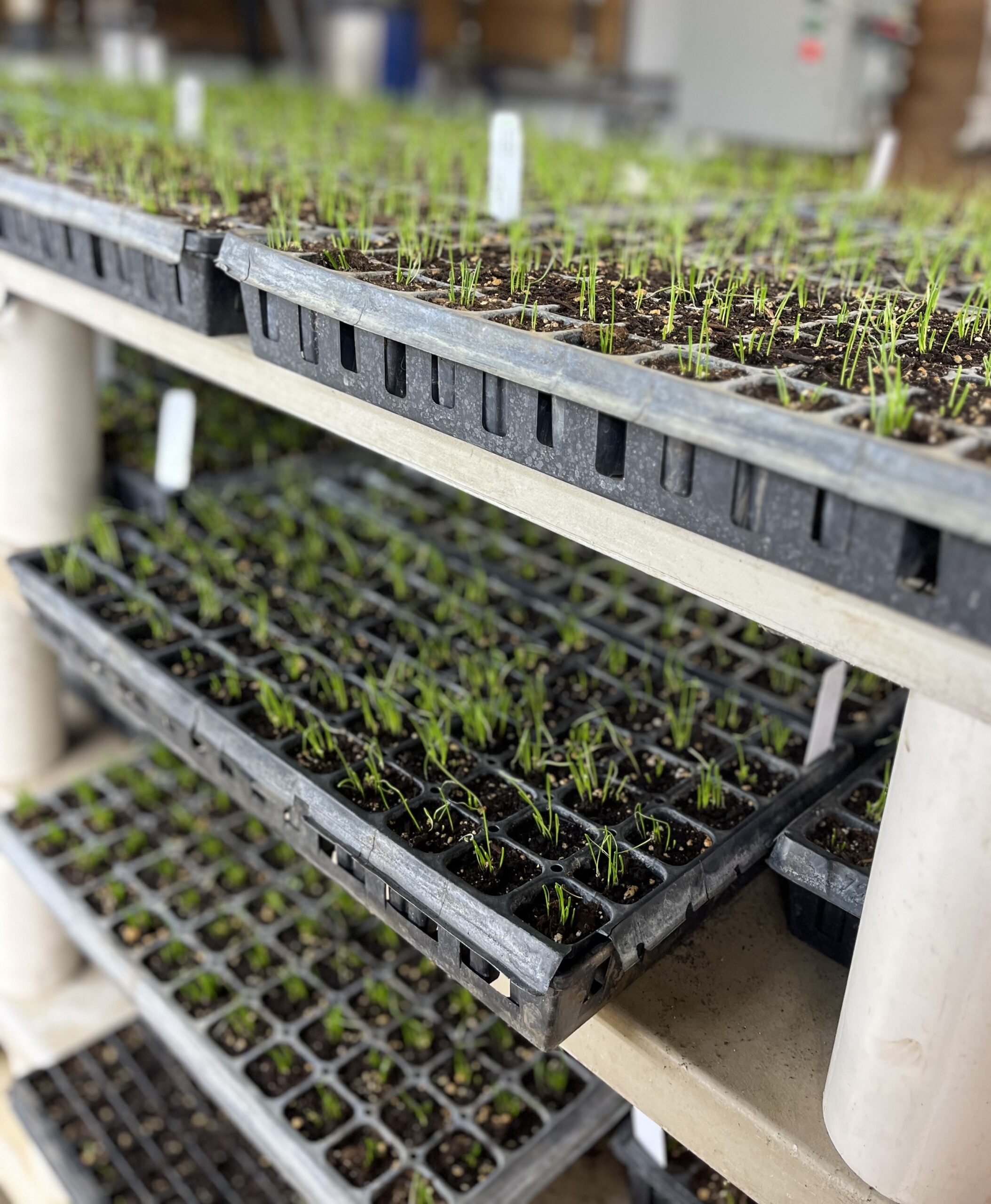by Eric Izzo, Assistant Farm Manager
Life is slowly springing up around McDonald Farm. Some of this life I find more exciting than others.
The first week of April on the farm, in no particular order, I walked by some blooming Virginia bluebells, the very first wild asparagus shoots, nice patches of tender stinging nettle leaves, the subtle yellow flowers of cornelian cherry dogwood, swelling buds of juneberry, recently germinated spinach and carrot plants, and oats + peas cover crop just beginning to poke out of the soil. I’m also starting to see plenty of garlic mustard, honeysuckle, quack grass, Canada thistle, perennial sow thistle, and the first ticks of the season.
I think I am most excited about the new human life springing up at the farm this past week, our full farm crew! We welcome back a mix of returning seasonal crew as well as two new crew members. Our greenhouses are quickly filling up with plants: plants for our fields and plants for our annual plant sale on Saturday, May 11th. Watering the greenhouses is no longer a quick task and with our fields slowly getting planted out, weeding will shift from our 90-foot greenhouse beds to our 500-foot field beds.
a mix of returning seasonal crew as well as two new crew members. Our greenhouses are quickly filling up with plants: plants for our fields and plants for our annual plant sale on Saturday, May 11th. Watering the greenhouses is no longer a quick task and with our fields slowly getting planted out, weeding will shift from our 90-foot greenhouse beds to our 500-foot field beds.
The first farmer I ever worked for liked to say it’s easy to feel good about where you’re at in April. Plants are growing relatively slowly, so staying on top of tasks like weeding is more manageable. Come May though, plants are growing rapidly and it can get out of hand if you don’t stay on top of things. Staying on top of things is a habit I’m working on. When I was in school, I was able to get away with procrastination. Writing a paper the day before it was due or cramming the night before a test wasn’t uncommon. Sometimes the “deadline” of an assignment or exam was the motivation I needed to get my butt going. I knew it wasn’t ideal, but I was able to get away with it frequently so the habit stuck around. There is no such thing as getting away with procrastination in farming. I’m tempted to say that it’s dangerous, but I think that’s an understatement. It is not possible to procrastinate and farm well. For example, if you procrastinate weeding a crop, the weeds will be bigger than if you were to have done it on time. Whether using a machine, a tool, or your hands, bigger weeds mean it will take more time to get your crop weeded. This will set you further behind because you won’t have as much time in your day to get other tasks done. You are now more likely to fall behind in planting and cultivating other crops, which puts you in a vicious feedback loop where everything you do takes longer and thus you don’t get as much done.
 When planning our season this winter, we created a work plan that spelled out the tasks we’d like to get done and when, week by week. Our thought process was that if we make sure to get each week’s tasks done on time, we should be in good shape. Part of the challenge of planning for a farm season is sitting inside on a cold, winter day (or a 50-degree day if it was this February) and being realistic about what we can accomplish during the rush of a farm season. We catch ourselves saying things like, “Well, we can just do a better job of staying on top of the weeds next season and we will be ok.” Something tells me that the many farmers who have come before me had the same thoughts. We have to be realistic with ourselves. Why didn’t we stay on top of them last season, and what will change this season?
When planning our season this winter, we created a work plan that spelled out the tasks we’d like to get done and when, week by week. Our thought process was that if we make sure to get each week’s tasks done on time, we should be in good shape. Part of the challenge of planning for a farm season is sitting inside on a cold, winter day (or a 50-degree day if it was this February) and being realistic about what we can accomplish during the rush of a farm season. We catch ourselves saying things like, “Well, we can just do a better job of staying on top of the weeds next season and we will be ok.” Something tells me that the many farmers who have come before me had the same thoughts. We have to be realistic with ourselves. Why didn’t we stay on top of them last season, and what will change this season?
As we sit here in early April, we are past writing our farm plan for the season. We are now in it. This part of the challenge is balancing our trust in the plan we drew up with the realization that we are humans and probably made some rosy assumptions in January of what we could get done in July. Even if we were perfectly realistic, sometimes Mother Nature has other ideas than what we planned. We have to stay on schedule, and we have to realize no matter what we do, there will be times when it is not possible to get everything done. In those moments, we will have to make decisions about which things get done and which ones don’t. What drives those decisions of prioritizing?
Just like with life forms, I feel no one is better or worse than the other. We only view them as more or less desirable based on their ability to help us survive. It is no different with our crops on the farm. With that said, my first wish this year is to get everything done which we wrote in our plan. My second wish is if (when) that doesn’t happen, because that’s how farming goes, our team is able to prioritize those tasks that are essential to us being a viable farm, good land stewards, and a relevant place in the community
Let’s grow!
Farmer Eric



